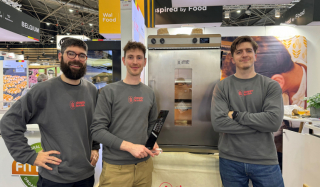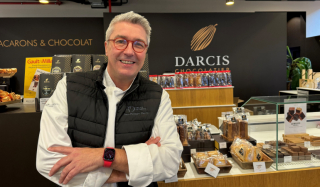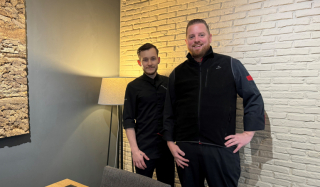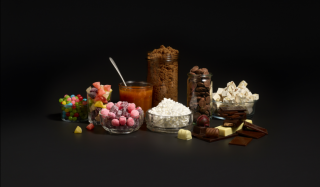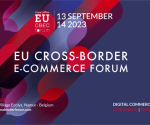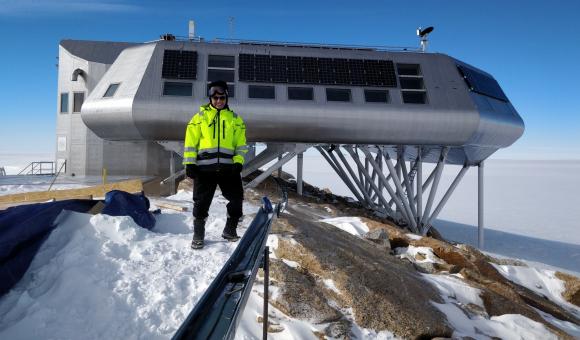
It has already been proven that Wallonia and Brussels have significant potential in the aerospace sector. The United Arab Emirates is aiming to become a regional hub in this domain following the launch of its first probe to Mars.
So it is logical to offer a masterclass presenting Wallonia-Brussels' excellence in this field during Wallonia-Brussels Week at the World Expo in Dubai. The WBI-AWEX joint Research & Innovation platform has entrusted this mission to two scientists from the Wallonia-Brussels Federation: Sarah Baatout and Vladimir Pletser. The two experts will lead an inspiring, dynamic dialogue on space exploration in Wallonia.
After the Moon, Mars is the next step in the conquest of space. A neighbouring planet to Earth, Mars is just a few hundred million km away and it only takes a few months to reach it. But cosmic radiation, long-term exposure to microgravity, psychological problems and possible contamination are all potential obstacles. There is still so much to study, discover and organise before a human crew can make this journey.
The scientific and technical research, know-how and expertise of Wallonia and Brussels are recognised worldwide, as shown by the masterclass created by Sarah Baatout and Vladimir Pletser, which is divided into several chapters, each devoted to a scientific project, and entitled "Belgian excellence in space art and science".
Each project presentation is followed by an art vignette on the theme of space. Sarah Baatout is participating in the European "Curious" project, which brings together researchers and artists; the performances of five artists from the Wallonia-Brussels Federation have been filmed in the Euro Space Center (painter Olivier Lamboray, culinary artist Isabelle Arpin, pianist Daniel Vives-Lynch, baritone Daniël Van Quickelberghe and cartoonist and scriptwriter Pierre-Emmanuel Paulis).
The afternoon of this space day will be dedicated to young people, with an event organised by the Euro Space Center. There is also a solar telescope accessible to the public on the roof of the pavilion.
Feet on Earth and eyes on the stars
Professor Sarah Baatout is Director of the Radiobiology Unit at SCK CEN (Belgian Nuclear Research Centre) in Mol, where she leads research in the fields of radiobiology, radiation protection, space biology and space medicine. She also teaches as a visiting professor at Ghent University and UCLouvain. She is currently studying the impact of cosmic radiation on European astronauts and Russian cosmonauts, to better understand how human physiology is affected by space radiation and how to better prepare and protect astronauts for longer missions to the Moon or guarantee the success of human exploration and protect the health of astronauts. She visited the Belgian Princess Elisabeth Station in Antarctica to study how health changes in this extreme environment, with a high degree of isolation and confinement best suited to long-term human missions in space. Sarah Baatout is also the Belgian representative to UNSCEAR (United Nations Scientific Committee on the Effects of Atomic Radiation) and a member of the Superior Health Council, and was awarded the prestigious Wetrems Prize for the best discovery in the field of natural sciences by the Belgian Royal Academy of Sciences and Arts. She was recently awarded the beSPACE Award for Personality of the Year, in recognition of her work in space research and outreach.
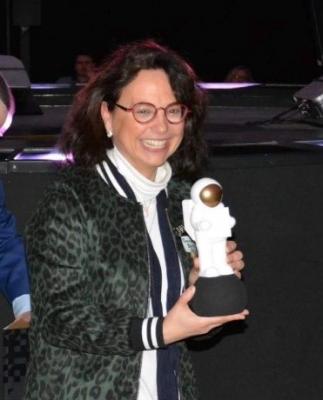
Dr Vladimir Pletser is Space Operations Training Director at Blue Abyss, and is proposing a new approach to astronaut training. He previously spent two years in Beijing as a visiting professor and scientific advisor at the Space Utilisation Centre of the Chinese Academy of Sciences, conducting research into microgravity in parabolic flights and the Chinese space station. For 30 years he was a senior physicist at ESA's European Space Research and Technology Centre, where he developed instruments for microgravity research on the International Space Station and coordinated parabolic flight campaigns. He has completed more than 7,350 parabolas, equivalent to 39.5 hours of weightlessness or 26 Earth orbits. As a Belgian candidate astronaut, he trained as a payload specialist at NASA and participated in three simulated Mars missions. He teaches in the field of space science and microgravity research as a visiting professor at over 20 universities around the world.
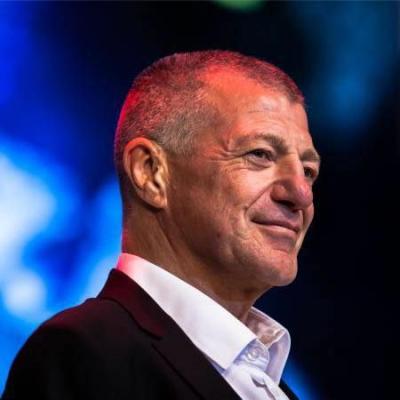
The importance of being in Dubai
Vladimir Pletser: "I was invited to participate in Wallonia-Brussels Week at the Belgian Pavilion and to present space research in the Wallonia-Brussels Federation, with my colleague Prof. Sarah Baatout. In Belgium, and more particularly in Brussels and Wallonia, we have researchers and scientists who are internationally recognised as being among the best in the world in their fields, and it is important to make this known to the international public. Space research in the Wallonia-Brussels Federation is extremely active from all points of view, and it must be said."
Sarah Baatout: "WBI and the Wallonia Export-Investment Agency invited me to participate in the Dubai World Expo and present my cutting-edge research in the field of space, carried out in collaboration with various Walloon, Belgian and European universities, research centres and industrialists. I am particularly honoured to present some aspects of our French-language Belgian space research and in particular to highlight several Walloon and Brussels flagships."
The two researchers believe that this masterclass is very important. They explain, "We have chosen to present several aspects of space research in the Wallonia-Brussels Federation. It is impossible to cover the entire space sector in Wallonia and Brussels in two hours. It is far too broad and comprehensive and it would take several days to present all the stakeholders involved in space research in the Wallonia-Brussels Federation. We have therefore chosen a promising and topical theme, namely the preparation of future human missions to Mars. We address six scientific chapters, showing the diversity of space research, interspersed with artistic vignettes highlighting the attraction that space also holds for artists in the Wallonia-Brussels Federation."
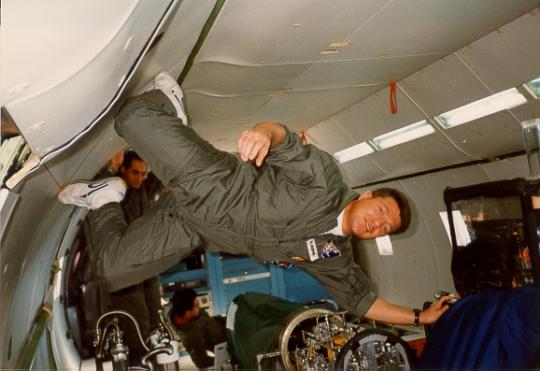
The two scientists look with pride on the aerospace sector in Wallonia and Brussels. According to Vladimir Pletser, "It is a very dynamic and constantly growing sector. The scientific results achieved in recent years make our researchers some of the best in the world. The technical expertise of engineers and young start-ups in the Wallonia-Brussels Federation is much in demand among the major aerospace companies, which are themselves involved in most of the major industrial contracts for technological development to support current and future international space projects, such as the return to the Moon and the exploration of Mars. It is important to remember that space belongs to everyone. Space research reaches a wide audience, not just scientists and engineers, but also artists and the general public."
Professor Baatout believes that "Walloon and Brussels industry plays a leading role in the aerospace sector. Many aircraft and spacecraft bear the mark of Wallonia-Brussels' know-how. French-speaking Belgium is also very active in the fields of space life sciences and space medicine. It has a wide range of infrastructure, including several international airports, the European Space Agency (ESA) satellite tracking station in Redu and the space telecommunications centre in Lessive."
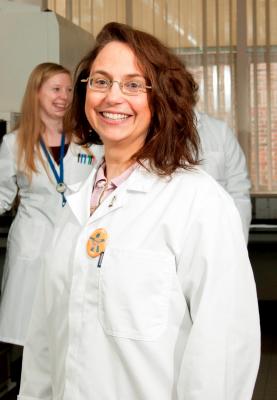
The future of humanity
According to Vladimir Pletser, "Space is the future of humanity. As Russian scientist Tsiolkovsky said, Earth is the cradle of humanity, but no one ever stays in the cradle for long. It is only natural that human beings should seek first to study and understand the near-Earth environment and outer space, and then explore this new environment. Furthermore, studying other planets, such as Mars, allows us to better understand our own planet, Earth. Observing it from an orbital position also gives us information on its climatic and meteorological evolution. And lastly, research on board space stations in orbit provides us with new knowledge, which has direct benefits for the well-being of humanity on Earth, such as a better understanding of the cardiovascular system and its disorders, and osteoporosis."
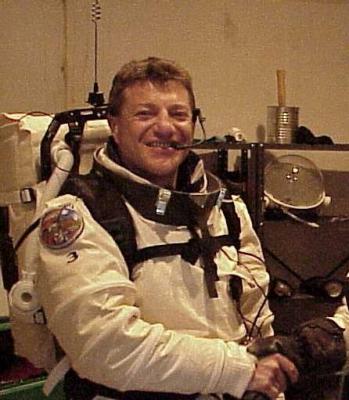
Space medicine to help on Earth
As Dr Baatout explains, "Space medicine is concerned with the health of astronauts in space. During space missions, the body changes due to weightlessness and reacts differently. The challenge today is to guarantee the health of astronauts during what promise to be longer space voyages. Specialists estimate that the body ages about ten years in six months. Muscles atrophy, bones become porous, and eyesight deteriorates. Medical research in space covers a broad spectrum that encompasses cognitive exercises, new drugs, specialised gymnastics exercises, efficient diagnostic systems, innovative cancer treatments and telemedicine. Experiments conducted on astronauts allow us to learn more about human physiology. When innovations arise, researchers soon transpose them for Earthlings. Space research is therefore helping to improve diagnosis and treatment on Earth."
What about young people?
"All areas of space research are expanding, says Vladimir Pletser. So there is always a need for young talent to participate in this dynamic space research and exploration. All professions are increasingly needed to support planetary and deep space exploration. The best advice we can give a young person is to be, and remain, passionate and never stop believing in your dreams. Passion for space is endless and constantly fills the heads and hearts of those involved. We must continue to pass on this passion to young people and explain to the public how important it is to invest in this process."
"Space exploration fuels our children's curiosity and imagination, explains Sarah Baatout. Role models such as astronauts and scientists inspire young people to dream and therefore to achieve their goals. Many astronauts, engineers, scientists and innovators remember watching the moon landing as children and being motivated to make their dreams come true. The next necessary steps for humanity will be to further explore the Moon and Mars, and to push the boundaries of what is considered possible, laying the groundwork for future generations to venture even further from our planet. All young people can be involved in this scientific, technological and human endeavour and play an important role in these next steps, pushing the boundaries and laying the foundation for future generations."
Wallonia-Brussels Week at Dubai World Expo 2020 will take place from 6 to 12 November 2021. Find the complete programme here.
